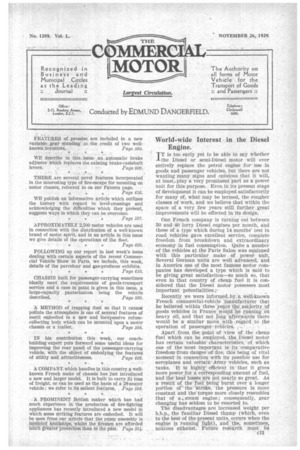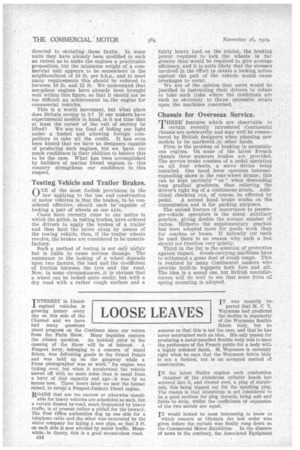World-wide Interest in the Diesel Engine.
Page 51

Page 52

If you've noticed an error in this article please click here to report it so we can fix it.
TT is too early yet to be able to say whether -I-the Diesel or semi-Diesel motor will ever entirely replace the petrol engine for use in goods and passenger vehicles, but there are not wanting many signs and opinions that it will, at least,play a very prominent part as a power unit for this purpose. Even in its present stage of development it can be employed satisfactorily for many of, what may be termed, the rougher classes of work, and we believe that within the space of a very few years still further great improvements will be effected in its design.
One French company is turning out between 30 and 40 lorry Diesel engines per month, and these of a type which during 14 months' test in road vehicles gave excellent service, complete freedom from breakdown and extraordinary economy in fuel consumption. Quite a number of the vehicles at the Paris Salon was equipped with this particular make of power unit. Several German units are well advanced, and in America one of the most famous motor companies has developed a type which is said to be giving great satisfaction—so much so, that even in that country of cheap fuel it is considered that the Diesel motor possesses most Important potentialities.; Recently we were informed,bee a well-known French commercial-vehicle -Manufacturer that he believed within three years the majority goods vehicles In France eyould -berunning on heavy oil, and that not long 'afteewards there would be a similar move with regard to the operation of passenger. vehicles. -e Apart from the -.point of :view of -.the cheap fuel which can :be employed, the Diesel motor has certain valuable: characteristics, of -Which one of the most important is its eoliiparative freedom-frona• danger -of -Pre, this being of vital moment in connection with ite possible use for aeroplanes and certain: Army vehicles, such as tanks, It is highly: efficient in that it gives more power Piz. a cOrreseidnding amount of fuel, And the heat losses are not nearly so great. As a result of the fuel being burnt over a longer portion of' the 'etroke, the pressure is more constant arid the'torque more closely resembles that of: 'tie-steam engine ; consequently, gear changing has seldom to be resorted to.
The disadvantages are increased weight per 13.h.p,, the familiar Diesel thump (which, even in the best of the-present units,. occurs when the engine is running: light), and the, sometimes, noxious exhaust. Future i.egeit:r6h Rinq
directed to obviating . these faults. In some units they have already been modified to such an extent as to make the engines a practicable proposition, but the minimum weight of a commercial unit appears to be somewhere in the neighbourhood of 10 lb. per b.h.p., and to meet many requirements this should be reduced to between 10 lb. and 12 lb. We understand that aeroplane engines have already been brought well within this figure, so that it should not be too difficult an achievement in the engine for commercial vehicles.
This is a world movement, but what place does Britain occupy in it? If our makers have experimental models in hand, is it not time that at least the corner of the veil of secrecy be lifted? We are too fond of hiding our light under a bushel and allowing foreign competitors to take all the credit. It has even been hinted that we have no designers capable of producing such engines, but we have too much confidence in their abilities to believe this to be the case. What has been accomplished by builders of marine Diesel engines in this country strengthens our confidence in this respect.




























































































































